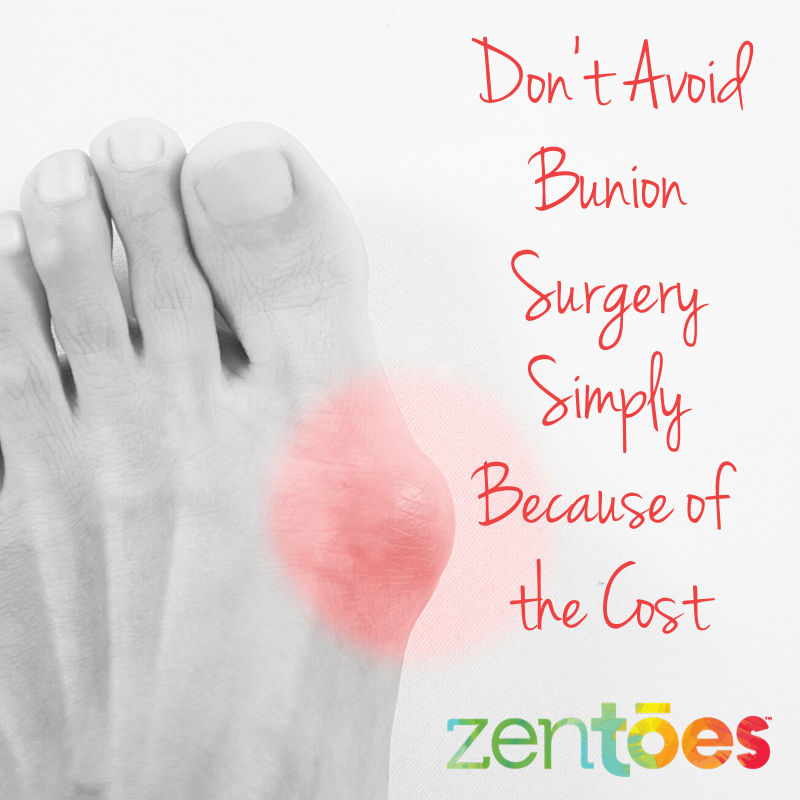Bunion surgery is a scary word to most people, and it is often due to more than just fear of the unknown and fear of the pain. To many, bunion surgery comes with a cost that forces them to put their health on the backburner. Fortunately, for most people, if you do your research and plan accordingly, the cost of bunion surgery can be managed.
What is Bunion Surgery?
If you have a bump on the side of your big toe joint that forces your toe against your other toes, it could be due to a bunion. In the past, bunion surgery has been known to be very painful and come with a long recovery period, but fortunately, new surgery that is less invasive and has a shorter recovery time is an option for some people.
Bunions will not simply go away on their own and typically get worse as time passes. They can cause problems with your feet, knees, legs, hips, and back which eventually lead many people to choose surgery to correct the painful condition.
Bunion surgery typically requires an incision to be made along the side or top of your big toe and the removal or realignment of soft tissue and/or bone. Although this is the most typical type of surgery, there are over 100 types of surgeries for bunions and most of them are done on an outpatient basis.
Determining the Cost of Bunion Surgery
There are a variety of factors that can impact the cost of bunion surgery, but research shows that the average price for bunion surgery is around $5,560, but can be is little as $3,500 or over $12,000. Insurance and location are two factors that can play a role in that cost. People that reside in a metropolitan area are almost always likely to have more options.
If you have insurance, they will negotiate a network rate with the hospital and doctor of your choice. This isn’t to say that you won’t have options, but those parties will have a huge impact over the cost of your surgery.
The type of procedure that you will have will also play a role in the cost of your surgery. If you have a more traditional surgery that requires a hospital stay, that cost will be more than an outpatient surgery. If an emergency happens during your surgery, this will also result in additional costs.
Your own health can play a role in the cost of surgery as well. If you have certain health conditions, it may make some types of bunion surgery impossible, or it may result in a longer recovery period. If you are relatively healthy and are able to have a minimally invasive procedure, it may be less expensive and result in less time off work.
Insurance and Bunion Surgery
If you have insurance, it is likely that it will cover at least part of the procedure. Bunions that are causing a change in the way you walk or causing you pain are considered medically necessary. However, if your bunion is small and not causing changes in your gait or resulting in pain, your insurance my refuse to cover the cost of surgery.
Of course, some insurances have a deductible, co-pay, or co-insurance that will impact how much you have to pay out of pocket. If your doctor is out of network, this can also lead to additional costs. Your insurance will almost always prefer that you use providers of their choice, but that doesn’t mean you are required to do so. Your health should always be your primary concern if at all possible.
Medicare and Bunion Surgery
Medicare will typically cover foot care, including bunion surgery as long as it is considered medically necessary. Approximately 35 percent of people ages 65 and over in the U.S. suffers from a bunion. Fortunately, Medicare Part B provides coverage for medically necessary supplies and services.
As a general rule, Medicare will cover 80 percent of the total cost of bunion surgery. The remaining 20 percent will be your responsibility to pay unless you have a secondary insurance policy to cover the difference. Deductibles and copays may also apply in certain situations.
Getting the Best Care
Keep in mind that you are not required to see a certain surgeon or have a certain procedure just because of your insurance. You have the right to seek out the best care that you can afford. Here are a few tips for getting the best care for your money:
- Compare and research local surgeons and get an estimate from them.
- Ask your insurance about their fees before your surgery including deductibles, co-pays, and co-insurance.
- Use your flexible spending account, health savings account, or health reimbursement account if you have one to cover additional expenses.
- Speak to your doctor and see what options they may have available to help reduce the costs you will be required to pay out of pocket.
You should not avoid bunion surgery simply because of your fear of the cost. The longer you put off surgery, the worse your bunion will likely get, which will make it even more expensive to fix when you can no longer avoid surgery. However, if after talking with your podiatrist, it is determined that your bunion doesn't require surgery, ZenToes has several products that can help relieve bunion pain and align your big toe, such as our Gel Toe Separators and Bunion Guards.


